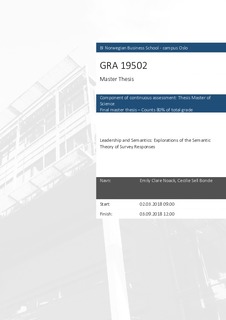| dc.description.abstract | There are various theories arguing for one definition of leadership over
another, and yet we find ourselves using circular explanations all the same (Eddy
& VanDerLinden, 2006). In fact, the words “leader” and “leadership” have
different, nuanced meanings depending on the different operating language
(Schedlitzki, Ahonen, Wankhade, Edwards, & Gaggiotti, 2017). Though we use
the word “leadership” in many settings--for example in the workplace, in schools,
in sports, in politics--we rarely pause to contemplate if we truly know what
exactly such a word entail.
How academic research on leadership translates to a practical setting can
be even more complicated. Researchers Avolio and Hannah (2008) observe that
there is not one accepted theory about how to develop leaders. Neither is there a
clear understanding about the organizational or individual factors that facilitate or
accelerate such development. Yet millions of dollars are invested in leadership
development programs in corporate and educational entities (Riggio, 2008). For
example, in a study completed by Lunsford and Brown (2017) which studied 69
collegiate leadership centers, annual budgets ranged from $1,500 to $900,000,
with near two thirds of the centers having a budget of $100,000 or more. Further
investigation led to the conclusion that the implementation of evidence-based
practices were not reflected in the leadership centers’ programs, philosophies or
mission statements. One has to wonder if wasted effort and money on leadership
and leadership development is due to our failure to solve the basic problem of
what leadership is and what it means to people.
Majority of the research on leadership and leadership styles has been
conducted through the use of field surveys (Yukl, 2013). For example, the
Multifactor Leadership Questionnaire (Bass & Avolio, 1990) is considered the
standard instrument for assessing a range of transformational, transactional, and
non leadership scales (Rowold, 2005). However, as researchers Podsakoff,
MacKenzie and colleagues (2003) point out, surveys are often part of the problem
when it comes to common method bias, especially due to item embeddedness. In
their critical literature review, they cite research by Harrison and McLaughlin
(1993), which further describes item-embeddedness as when the respondent, after
analyzing clues from context, use an easily accessible set of cognitions to answer
subsequent items. Could these context clues be the logic, linguistics, and meanings of the words used in the questions themselves? In line with the research
of Arnulf and colleagues (2014), we think the answer could be ‘yes’.
The purpose of this paper is to examine whether it is possible to design an
experiment that allows us to study the difference between semantic and emotional
determinants of survey responses. To accomplish this, we will first review the
literature on leadership surveys and how the semantics of survey questions have
potentially skewed our understanding of the concept itself. We will then discuss
some of the empirical studies examining the cognitive processes that take place
when subjects fill out such surveys, and whether it is possible to contribute to the
theory using fMRI technique. Finally, we will conduct a behavioral experiment to
test the STSR by specifically manipulating temporal aspects of surveys, which in
theory should have no effect on semantic predictability of responses. | nb_NO |
